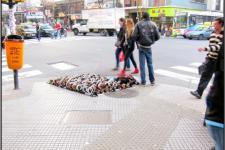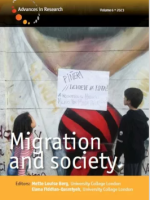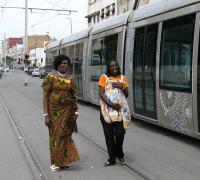How do migrants navigate informal urban street economies?

Migration & Society's new special issue titled "Transnational Street Business: Migrants in the Informal Urban Economy" sheds new light on how migrants around the world establish business niches for themselves within informal urban street economies. The collection of articles explores the lived experiences of migrants in urban settings, where they often face discrimination and violence but also encounter hospitality. The issue features stories of Somali migrants in Athens, East African market stall workers in Durban, and Romanian pimps in the transnational sex work market. DIIS Senior Researcher Ida Marie Savio Vammen contributes with the article: “Channeled into a Transnational Street Vending Hub: Senegalese Street Hawkers in Buenos Aires”.
Two decades ago, Senegalese and other West African migrants increasingly started to come to Latin America in search of better opportunities due to restrictive migration policies in Europe and North America and the global economic recession. Building on long-term ethnographic fieldwork in Buenos Aires, the article explores the social practices that help migrant newcomers become mobile and embedded in the large informal labour market. Similar to how West African traders in other cities around the globe have transformed public spaces and made them into nodes of globalized African networks, Senegalese migrants in Buenos Aires started to occupy the public space and sidewalks. From impoverished stalls, they created a niche in the city's sizeable informal economy of street vending, selling jewellery, copies of designer watches, sunglasses, handbags, leather belts, and purses often manufactured in China. The article shows how an invisible social infrastructure emerges when people cannot access or are excluded from the formal labour and facilitating structures created by the state, city governments, or NGOs. It highlights the migrant's everyday experiences within the racialised and precarious economy of street vending and how established migrants help newly arrived migrants navigate and access opportunities in the city. Thereby reproducing the migration trajectory that fulfils social expectations in Senegal. However, the article also shows that this process creates new social alliances and tensions among migrants, especially when specific roles and expectations become contested.
The Migration & Society special issue is open access; you can find the article and the whole issue here.
DIIS Experts



